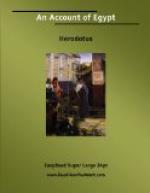gulfs boring in so as almost to meet at their extreme
points, and passing by one another with but a small
space left between. If then the stream of the
Nile should turn aside into this Arabian gulf, what
would hinder that gulf from being filled up with silt
as the river continued to flow, at all events within
a period of twenty thousand years? indeed for my part
I am of the opinion that it would be filled up even
within ten thousand years. How, then, in all
the time that has elapsed before I came into being
should not a gulf be filled up even of much greater
size than this by a river so great and so active?
As regards Egypt then, I both believe those who say
that things are so, and for myself also I am strongly
of opinion that they are so; because I have observed
that Egypt runs out into the sea further than the
adjoining land, and that shells are found upon the
mountains of it, and an efflorescence of salt forms
upon the surface, so that even the pyramids are being
eaten away by it, and moreover that of all the mountains
of Egypt, the range which lies above Memphis is the
only one which has sand: besides which I notice
that Egypt resembles neither the land of Arabia, which
borders upon it, nor Libya, nor yet Syria (for they
are Syrians who dwell in the parts of Arabia lying
along the sea), but that it has soil which is black
and easily breaks up, seeing that it is in truth mud
and silt brought down from Ethiopia by the river:
but the soil of Libya, we know, is reddish in colour
and rather sandy, while that of Arabia and Syria is
somewhat clayey and rocky. The priests also gave
me a strong proof concerning this land as follows,
namely that in the reign of king Moiris, whenever
the river reached a height of at least eight cubits
it watered Egypt below Memphis; and not yet nine hundred
years had gone by since the death of Moiris, when
I heard these things from the priests: now however,
unless the river rises to sixteen cubits, or fifteen
at the least, it does not go over the land. I
think too that those Egyptians who dwell below the
lake of Moiris and especially in that region which
is called the Delta, if that land continues to grow
in height according to this proportion and to increase
similarly in extent, will suffer for all remaining
time, from the Nile not overflowing their land, that
same thing which they themselves said that the Hellenes
would at some time suffer: for hearing that the
whole land of the Hellenes has rain and is not watered
by rivers as theirs is, they said that the Hellenes
would at some time be disappointed of a great hope
and would suffer the ills of famine. This saying
means that if the god shall not send them rain, but
shall allow drought to prevail for a long time, the
Hellenes will be destroyed by hunger; for they have
in fact no other supply of water to save them except
from Zeus alone. This has been rightly said by
the Egyptians with reference to the Hellenes:
but now let me tell how matters are with the Egyptians




